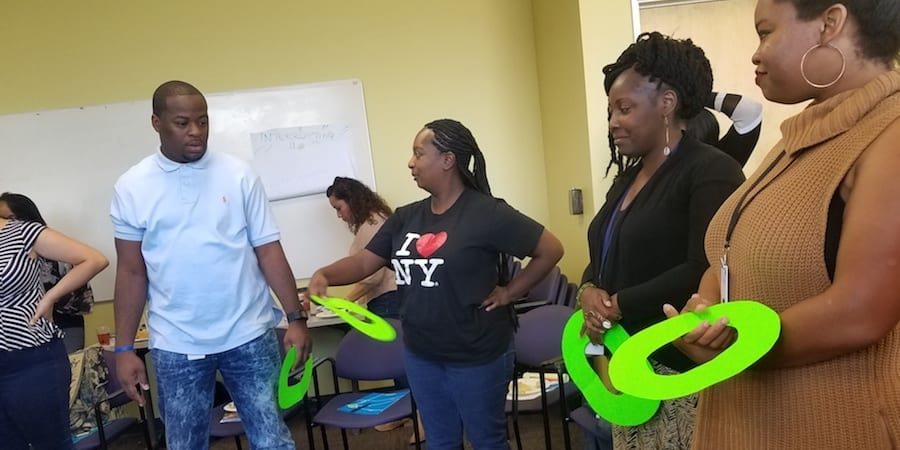
Deep dive in a lean digital company #3
FEATURE – The third article in this new series discusses Theodo’s approach to talent recruitment and development, to ensure the right resources are there to support the company’s growth at all times.
Words: Catherine Chabiron, lean author and member of Institut Lean France
During my third visit to French lean digital group Theodo – read about my previous visits here and here – I am curious to understand how they manage to ramp up their activities and recruit at a speed that matches their growth. (As you will have read in the previous chapters of this story, they are growing despite the pandemic.)
Marie, the group’s Head of HR, is my host today. Staying true to her word when we planned the visit, she takes me straight to her gemba. We immediately enter a room where young men and women – all masked up – are discussing which questions can help assess a candidate’s profile during the recruiting process. “These are the Team Leaders in charge of recruitment, coming from Theodo’s various companies,” Marie confirms. “Some are fully dedicated to recruitment, while others are with us on a part-time basis. We call their teams the Growth Teams, as they recruit to keep up with our growth pace.”
The team is organized as a community of practice and meets for 30 minutes every week to share insights and learnings. Today’s subject is candidates’ interviews and Louis, one of the Team Leaders, is telling the team about his experiments with a new list of questions that were inspired by Geoff Smart and Randy Street’s book Who. His objective is to better assess profiles and improve Theodo’s right-first-time record in recruitment. The discussion is open, with Marie guiding the group on open points and what items on the list could be further improved.
RECRUIT THE RIGHT PEOPLE AT GROWTH PACE
Theodo is a galaxy of different entities, such as the fintech Sipios discussed in the previous article, each offering a variety of services and technologies in different market niches. As Marie points it out, “the group is engaged in customized service activities, and our main product is really our people. This makes every hire a critical decision.” Knowing this, Marie saw very early the need to develop the skills of the Growth Team Leaders.
“We have 215 hires scheduled this year, basically one for every working day,” she tells me. “To keep up with the pace of our growth, but also to cover the churn.” Theodo’s staff turnover is below the market rate of 23% – based on the type of work and the average age of team members – but high enough to put a significant burden on the growth teams’ shoulders.
The task is not easy. It typically takes 10 messages to achieve a call and 10 calls to secure a recruitment. Even recruiting someone fresh out of school requires a major upstream effort. You need to know where to find them and to keep track of each and every student in Computer Science from their second year onwards. There is a lot of competition, which means you need to spot your targets and keep them interested. The targeted profiles are invited to Theodo for free training or to “learn from my life as a Dev” sessions organized by each of the group’s companies. “We may even assist them on a specific issue with a free speed-coaching session,” Marie adds. Then comes the recruitment and here, again, there is a risk that the recruiter may not be convincing enough or fail to spot a weakness in the candidate’s profile.
Again, Lean Thinking and Theodo’s general belief that “problems are welcomed” help the teams to keep the progress going. Managers are regularly asked whether the recruited profile is up to their expectations and, even more to the point, how thorough the Growth Team was in evaluating the candidate’s true potential. Learning from gaps today is the best way to deliver better and more efficient hires tomorrow.
Growth Teams have to develop a large array of skills. They turn themselves into community managers, targeting both students looking for a job and more senior profiles already in the job market. For this, they need to both know the job position they are recruiting for – most actually hold such a position and recruit as a side job – and how to spot great profiles. As lean thinkers, they experiment with visual management and learn through kaizen.
Marie shows me the virtual obeya each Growth Team has developed during the pandemic. “By mid-2020, between the pandemic and the remote working, most of our Team Leaders began to obsess over delivering new hires, but stopped exploring new ideas and engaging in kaizen,” Marie explains. “We were no longer taking the time to think together, as we did when we were all in the office. This is why we started to develop virtual obeyas entirely focused on questions and risks we needed to address.”
Together, Marie and I peruse those shared working spaces on the intranet. She shows me some of the questions they have come up with. “I did not want to give them solutions,” she tells me, “but rather share the problems they need to address and let them find their own answers.” The questions raised are about meeting the recruitment targets, on-time delivery, quality, but also on whether they are focusing their attention on the right subject or whether the team has everything they need to succeed.
Each team has built a local answer to each of those questions, ranging from a production plan and kanbans to skills matrix and kaizen.

TRUST IS THE FOUNDATION, LEARNING TOGETHER IS THE GAME
Earlier in the day, I had a very interesting conversation with Julien, the CEO of Theodo France, one of the group’s main companies and the first one to be created. Recruiting is not the only challenge; there is also talent retention and development. With remote work and the anxiety created by the pandemic and the economic uncertainty it brings, there was a huge risk that people would feel abandoned, left behind.
Julien is well aware of this risk. “We need to maintain a feeling of safety and trust in the company. With remote working, we had to change our ways. Before, we would meet in the office, have stand-up meetings and write on the walls. Now people often work from home and seldom meet the entire team in the office. We have therefore put emphasis on weekly communication, to tell them what is going on, share good news and make them aware of any risks or poor performance. We treat them with respect. They need to know what we are working on and how they may be impacted,” he tells me.
So, how do they do that?
First of all, they didn’t change their Monday routine despite the remote working arrangements. They have been running an asakai meeting at 9:30 every Monday for quite some time now, in the pure Japanese tradition of quick, regular feedback from the boss on the business context and strategy. The meeting is held in the dojo space, and people can either attend physically or remotely using the ad-hoc technology solution the company set up for the first lockdown. The asakai meeting is an opportunity to news, good and bad, and to explain what the group is doing about it.
At 12:00, it is time for the dojo – one of the learning and sharing moments at Theodo. Led by top managers and open to all Theodoers, the dojo teaches the basics of a project board, a useful learning for newcomers (how a project is performing, what could be improved, what went wrong, and so on).

Additionally, Julien has developed an internal Theodo TV program, called “Backstage”, where he, as CEO, conducts weekly short interviews with team members right at their workstations. These are generally used as an opportunity to share a new practice, a new solution that might help other team members (like a code generator to initiate a project and decrease the pain of its set-up).
Julien and I watch one episode of the program. The tone is light – the animations and jingles in the video a reminder that we are indeed in the tech world – but the content is serious. The problem is described, the solution proposed and demonstrated. Videos usually end with a call for ideas and contributions. “This content is available to everyone at Theodo. We find it is a great way to shed a light on improvement ideas and their execution, and to launch exchanges and discussions. It’s also a great opportunity to improve our storytelling and media usage capabilities,” Julien adds. I smile as I remember the Kan-Pro program launched in the late ‘70s by Toyota, which had a similar objective – to foster improvement, develop management skills and boost storytelling capabilities. More than 40 years later, lean management is still at it.
But there is more to it. “I see it exactly like flows pulled by shipping trucks in a plant. Sales will have told us of a new project with a customer at the asakai meeting, together with a specific difficulty they face, and in “Backstage” I highlight what could help to solve this issue. The point we are trying to convey is that Theodo is a safe working environment, with quality content. It’s ok to talk about problems, and the scientific approach used in the demos offers a refreshing contrast to the fake news and so-called expert advice we hear on the media and social networks all day long.”
Julien is a firm believer of building and nurturing trust in the organization. He shows me the intranet website they have developed when the first lockdowns came. It’s totally open to all Theodoers and addresses topics, such as the company’s strategy, how to choose a chair for optimal remote working conditions, or what was discussed at the last asakai. It also includes a MIRN (Most Important Right Now) to-do list assigned to top management and a transparent feedback on what they are doing on it. MIRN includes topics such as training, bug monitoring, and flexibility. There are no restrictions on access; there is full transparency.
Feedback is also bottom-up, with regular anonymous NPS (Net Promoter Score) surveys run among Theodoers. Julien also sits for a breakfast with four to five people every week, grouped by year of arrival, to hear from them what they like and what they don’t about working at Theodo.
Reflecting on all this, this way of treating employees with respect has a lot of benefits: no beating around the bush, bad news first, listen and act on it. Full transparency also empowers each team member and gives them the means to “sell” Theodo to the outside world and increase brand awareness.
A DEVELOPMENT PLAN FOR EVERY PERSON
Feeling safe and recognized is great, but may not be enough to retain ambitious talents. I am back with Marie, who is showing me how for each new hire there is a clear career development plan spanning six years. “Management is not the only career path. We also have an expert path. The point is to value people based on what they bring to the table,” she says.
Moving from one level to the next is no small feat. To grow in the company, you need to convince a jury of peers that you have the skills needed for the job. And you will be challenged: you could be asked, for example, to answer questions like “Would you be prepared to work with this specific person on a difficult project?”. “The question raises many interesting points, such as how to manage conflicts, the art of negotiating with others, the ability to look at the gemba with someone else’s eyes,” Marie tells me.
She admits there has been some failure in the past. She has no qualms showing me a kaizen maturity model that had been enforced as one of the criteria for moving up in the company. People were expected to follow it step by step to reach the nirvana of innovation. “We found innovation cannot be summoned by decree. It’s far more organic: creating the conditions for kaizen and innovation has a better chance of success than a detailed modus operandi,” she says.

SENIORS COACH JUNIORS
Marie interrupts our conversation, as she has a meeting scheduled. It’s time for a session of speed coaching with Louis, the Growth Team Leader at BAM (another company in the group). “Each of us is regularly coached by a more senior person, and today I am coaching Louis. Would you like to join us?” Marie asks me.
I do. Once we get confirmation from Louis that it’s okay for me to be there, Marie starts with the virtual obeya for the BAM Growth Team. The number of hires to achieve, as testified by the pending kanbans, is huge. Marie probes Louis with careful questions: “Isn’t this display of kanbans representing a few months’ worth of work?”, “Isn’t this likely to generate anxiety for the team?”, “What is the minimum to achieve to avoid hurting BAM’s customers and teams with delays, poor quality or overwork?”. Marie also tests Louis’s ability to develop the skills of his team through the assignment of kaizen tasks. But she does not forget to celebrate the wins, when she sees them.
Recruit, build trust, share kaizen, talk to communities, create a development plan for each person, listen and coach. When the profile is right, help people to think out and lead a new Theodo spin-off designed to cater for a new niche in the market. Indeed, through its experiments, Theodo is pioneering the use of lean in Human Resource.
Stay tuned for more, our next visit will address an interesting question. How do you do a gemba walk in a virtual tech world?
THE AUTHOR

Read more


INTERVIEW – An organization in the San Francisco Bay Area is using coaching to increase its impact on the lives of foster youth. We had a chat with an extraordinary group of women to learn how they are doing it.




FEATURE – An obeya room can be the cornerstone of a lean transformation, but developing a successful visual management environment is easier said than done. Nike’s Technology department shares a few tips.


INTERVIEW – We speak with Sérgio Caracciolo of General Motors do Brasil about the carmaker’s approach to lean, its struggles, and its lessons learned.

